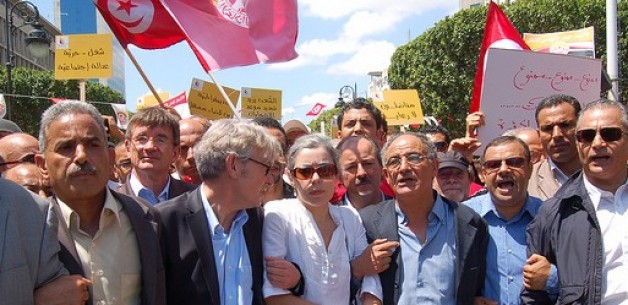This post is also available in: Arabic
Tunisian trade union leader protest in Tunis on May 1, 2012
Original image by flickr user scossargilbert (Creative Commons BY-NC 2.0)
On a recent visit to Washington, DC, representatives of the Tunisian General Labor Union (UGTT) met with senior officials at the World Bank including the country director for Tunisia to discuss the Bank’s involvement in the country generally and its engagement with the union particularly.
The union representatives raised several concerns related to the Bank’s historical involvement in the country. According to them, Tunisians remain skeptical of the Bank given its reputation in the country as a supporter of the Ben Ali regime. The Tunisian revolution has revealed that the country recently promoted as a model for development in the region is in reality suffering from high rates of unemployment, a lagging education sector and a slowing economy. The representatives stressed the need for a prudent approach to investments that ensure social and economic equity and an assessment of the education system which is the sector most affected by corruption. The Bank officials acknowledged the shortcomings of the Bank’s approach pre-revolution and confirmed its support to Tunisia and its efforts to engage with different stakeholders during this critical transitional period.
Although the revolution highlighted the need for more jobs as the most pressing issue facing Tunisia, it is not unemployment alone but also the lack of a social justice dimension to employment guaranteeing equal opportunities that helped create the conditions for the revolution. As the Bank and other donors rush to fund job-creating projects and initiatives in the country and given the important social role played by the labor union in Tunisia, the representatives stressed for more meaningful engagement with the Bank on programs related to employment in order to ensure that these employment schemes are equitable and adhere to fair labor standards. The Bank officials responded that they regularly consult with the union’s analytical unit on technical issues, most recently on the budget support loan given to Tunisia by the Bank last year and a similar one that is currently being prepared. Moreover, the Bank officials present committed to more formal, frequent and meaningful engagement with the union through the Bank’s Tunis country office.
We at BIC MENA will continue to facilitate the engagement of the union particularly and Tunisian civil society in general with the World Bank especially during this critical transitional period.

